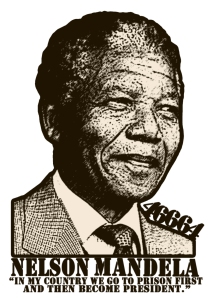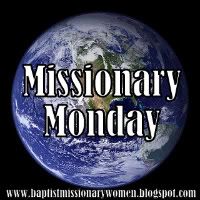Here in South Africa starting in 10th grade, the students have to choose which track they will take in school--one heavy on business and accounting or the sciences or history and social studies. If they do not choose the history track, they learn very little history in school.
But missionaries never stop learning history. Or they shouldn't. For one thing, we are in the middle of living history. Nelson Mandela died last week. This is such a huge, real moment to South Africans--and all blacks or those struggling with freedom from racism.
Who was Nelson Mandela? I had heard the name but didn't know him until I became a missionary to South Africa. I got world history a few times in school, but you know how you never seem to get to the final chapter or two of the history textbook in school? Not enough time. So Mandela was little more than a name to me.
 It is important for me as a missionary, though, not to show ignorance and apathy about a name that meant little to me, but is heroic to many of the people I live with. And therefore, he should have great significance to me. He (and the former white president of SA--F.W. de Klerk) did a great service for the blacks of SA. But even more, perhaps we could say he did a service for the whites. Because all of the hate and anger and injustice served to a people group for decades could have rolled back in a tidal wave of revenge on whites who did not begin the system yet kept it going and lived in it.
It is important for me as a missionary, though, not to show ignorance and apathy about a name that meant little to me, but is heroic to many of the people I live with. And therefore, he should have great significance to me. He (and the former white president of SA--F.W. de Klerk) did a great service for the blacks of SA. But even more, perhaps we could say he did a service for the whites. Because all of the hate and anger and injustice served to a people group for decades could have rolled back in a tidal wave of revenge on whites who did not begin the system yet kept it going and lived in it.And then maybe we would not be so welcome here as (white) missionaries. Maybe SA would have gone the way of Zimbabwe with a dictator who cannot give up power, chases the whites off their farms, and impoverishes his people through corruption and fear tactics.
Mandela's example of peace and forgiveness protected many whites and blacks from what could have been a messy civil war. He and de Klerk truly deserved the Nobel Peace Prize they received together in 1993 (unlike America's president now, who apparently got it simply for his color, not for any actions associated with it?)
And then unlike many African politicians, he freely gave up his presidency after one 5-year term. His people loved him. They would have voted him in forever if he had chosen to change the laws and preserve his power and fame. But he didn't. And that in itself is praiseworthy in a continent full of politicians who give lip-service to democracy until their inability to allow themselves to be voted out or serviced out shows that they never really gave up their tribal monarchy ideals.
"The history of liberation heroes shows that when they come into office they interact with powerful groups: they can easily forget that they've been put in power by the poorest of the poor. They often lose their common touch, and turn against their own people."--Mandela as president, 1996Was he perfect? Well, not by American standards. And that's another reason missionaries need to learn history, specifically national history of their country of service. There are those troubling connections with terrorists and Communists who supported him financially, in training, and with weapons and other promised aid.
So when one church member this week emotionally told me that Mandela was the greatest statesman who ever lived, and then slightly shocked and embittered said, "America called him a terrorist!" I had to think fast. I have never read a biography of Mandela, and my grasp of modern history is only so-so. I did come up with enough to hopefully explain America's lack of support for Mandela in the situation.
No, we weren't supporting racism. America has almost always stood as a bastion for freedom. There was that pesky Cold War we had just gone through where we were *this* close to blowing up Russia and vice versa, so maybe we didn't take that well when Mandela and Co. went to get training and weapons from them. ??? Uhh...same thing with support from Cuba. Yeah, that wouldn't be seen as a good thing by the US of A.
Isn't it funny how history can lead to ethics though? Here is this beloved politician who can do no wrong to South Africans, and this church member says to me, "But he had to take money from wherever he could! If I were in his situation, I would do it for freedom! America should have supported him anyway, at least verbally!" Hmmm. Oh boy, what to say? Do I plead the 5th, since my knowledge of to what extent America supported Mandela or apartheid is admittedly lacking (and I suspect my friend's was as well...)? Do I realize that what he's really seeking is affirmation that yes, Mandela was great, and therefore your culture and race can do really great things? Do I stick with an old adage? "It's never right to do wrong to make something right."
Probably the worst thing to do in that situation is to take umbrage that no matter how many billions of dollars in aid America sends every year to Africa we can still do no right in the eyes of Africans: always, we should have given more, or taken up this or that war--and then when we do (Iraq), they say we interfered under false pretenses. Sigh. I'm afraid I didn't pass that test so well. Ah, well, live and learn. At least, that's what we're supposed to do from history--learn!
Maybe I should learn from Mandela how to better be a peacemaker.
So all that to say, missionaries, that once again, our job is not as easy as "A-B-C, 1-2-3, Pray with me." There is a whole history behind the worldview of the people we minister amongst, and it is our duty (and pleasure) to learn it.


3 comments:
Excellent, Amy! I totally agree. It's important, especially to understand where we live and serve. Very good article. I liked the A-B-C-1-2-3-Pray for me. Great!
Thanks, Lou Ann! We have to fight our American tendency to be myopic. :)
As a fellow missionary a few countries north in Africa, I can completely relate to this post! There is so very much more involved in missions, loving and understanding your people than just giving the gospel. Having to "rewrite" history mentally for every conversation with the Zambians was a big part of cultural adjustment for me those early years.
Post a Comment